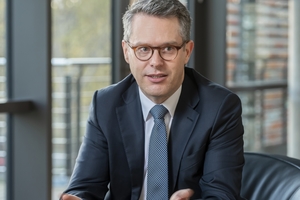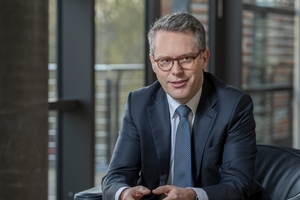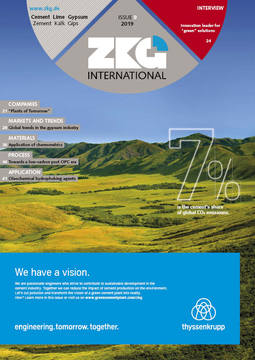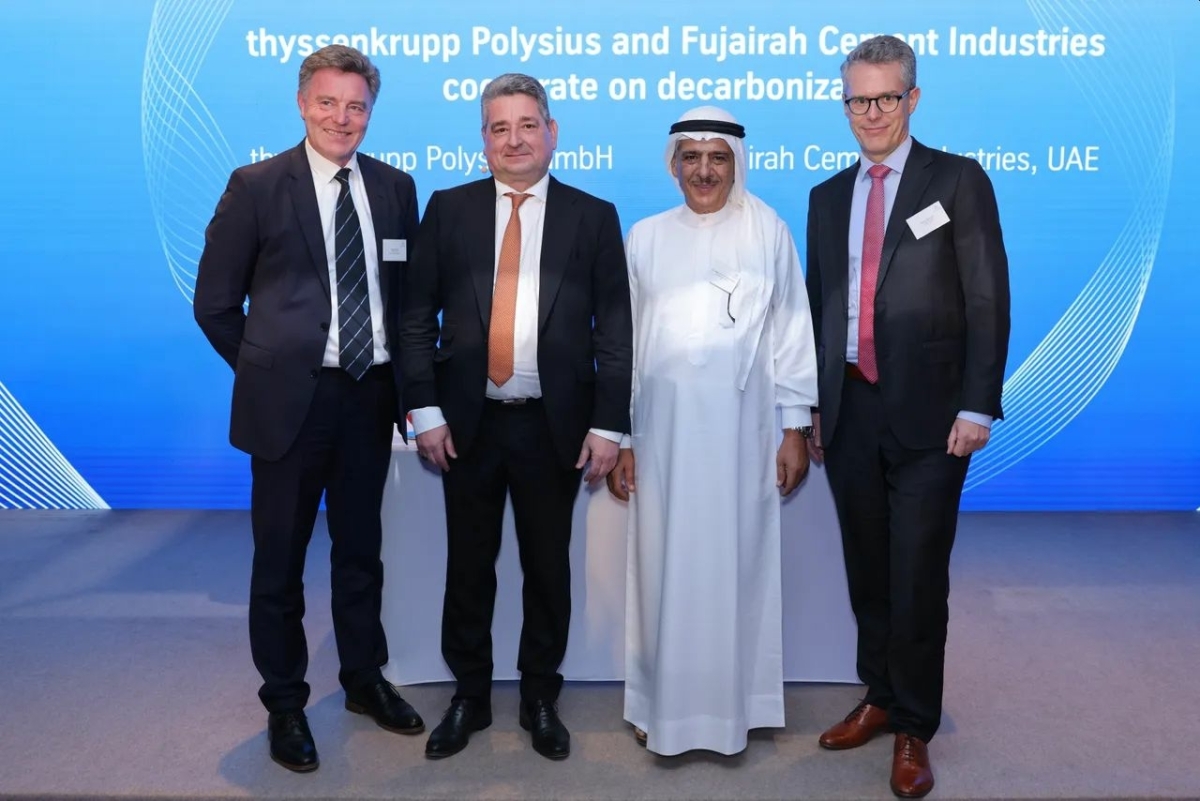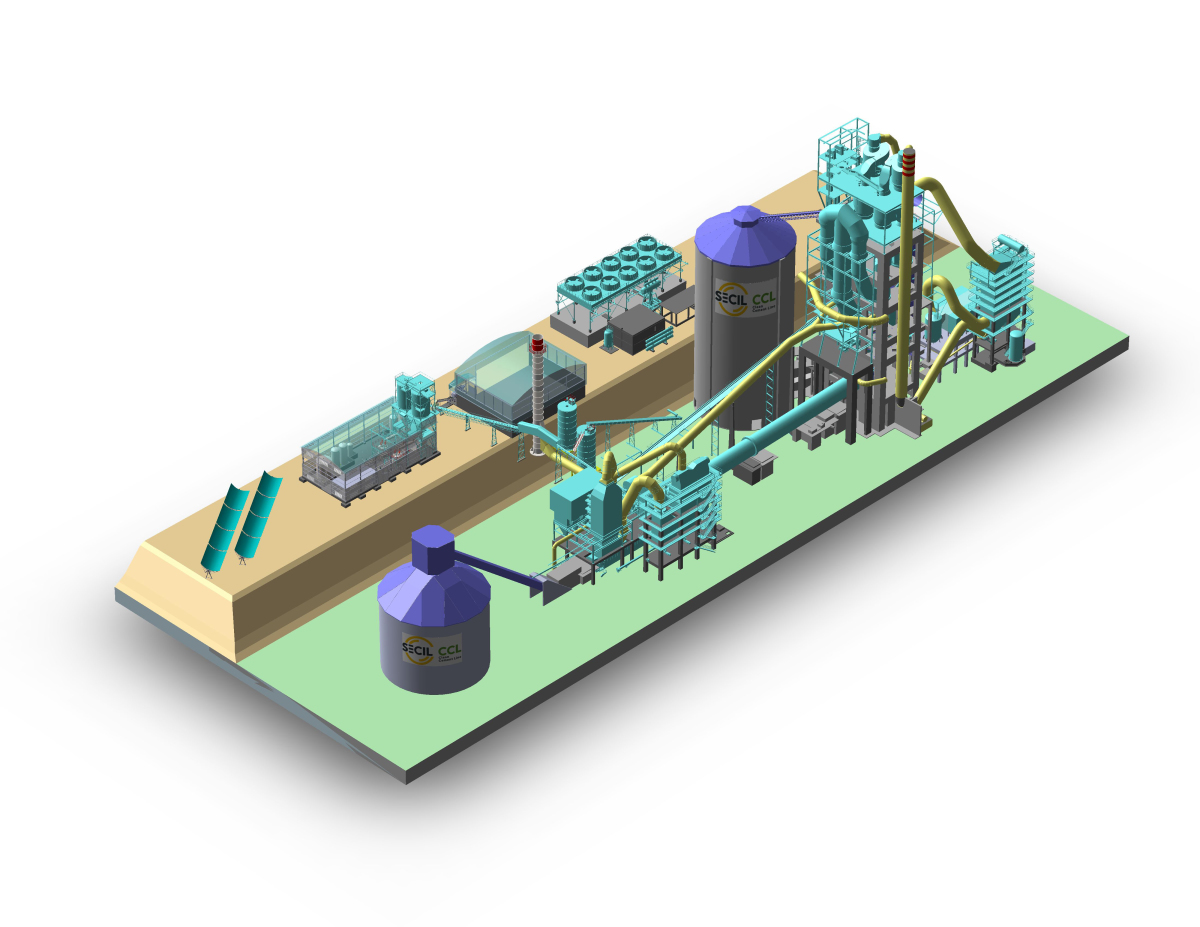Interview: Innovation leader for “green” solutions
thyssenkrupp Industrial Solutions has an active commitment to more sustainable, efficient and environmentally friendly cement production and is already offering the industry CO2-reduced solutions of relevance. We asked Pablo Hofelich, CEO of Business Unit Cement Technologies at thyssenkrupp Industrial Solutions since November 2018, which concepts the engineering and plant contractor has in mind for the future.
You have been CEO of the Cement Technologies business unit at thyssenkrupp Industrial Solutions since November 2018. What topics have you already tackled in the first half of the year?
Looking back over the past few months, it is impressive how many topics we have tackled – be it a stronger focus on customers and markets, organizational changes and internal processes to improve our project management, or the development of new technologies and opening up new markets. We will continue to work hard on these issues. We are currently in an exciting but also very challenging phase. This is particularly true in view of the diverse tasks facing the global cement industry today. Our industry environment continues to be extremely competitive and characterized by overcapacities built up in recent years. At the same time, there is an acute need for action in the cement and lime industry to achieve more sustainable, efficient and environmentally friendly production. All this makes it clear to what extent we will have to develop further in order to achieve our self-imposed goals in the cement plant engineering business.
You have previously worked in the power plant industry and are familiar with large-scale plants. What distinguishes the cement industry from the power plant industry? What are the biggest challenges for you?
The power plant industry has undergone drastic changes over the past decade. The megatrends of decarbonization, de-centralized power generation and digitalization have redefined the coordinates of the energy sector and thus the environment for plant constructors as well. In many markets, the new fossil-fuelled plant business has collapsed in a very short space of time. Increasing environmental awareness in large sections of society and the corresponding energy and environmental policy decisions have disrupted the market. One thing is clear: when an entire industry is turned upside down, established companies also have to reinvent themselves to safeguard their position. A similar development can be observed in the cement world today – at least in its early stages. Cement production is a very energy-intensive process and the industry is one of the world’s largest CO2 emitters. At the same time and for the foreseeable future, cement will continue to be an indispensable raw material for infrastructural expansion worldwide. We can thus expect global demand to even increase. This makes it all the more important in the future to develop possibilities for low-CO2 to CO2-free cement production, and to implement them on an industrial scale. This is what we are working on at thyssenkrupp. Today, we are already offering our customers the first products, and many more are currently being developed.
thyssenkrupp is involved in the individual machine business and in overall plant construction. What strategy will you pursue in the future?
We have extremely passionate engineers. Our great strength is our technological expertise – from individual machines to complete plants. We also maintain very long-term partnerships with our customers. Therefore, we see that in the future, it will no longer be sufficient to think in terms of plants and components. In the cement industry, automation and digitization only make sense if optimizations are made along the entire production process. We will therefore continue to cover all the essential components of cement production and offer complete turnkey plants. On the other hand, our success is based on in-depth process knowledge with which we can optimally integrate our individual machines into existing plants. Overall, we will embed our technologies even more strongly in a larger architecture of services, digital platforms, and integrated solutions. One thing is clear: our integrated range of products and services is geared to our customers long-term economic success. Looking to the future, our goal is to become the innovation leader for “green” solutions. Technologies for sustainable cement production will continuously complement our portfolio of complete plants and individual machines.
You’ve already mentioned that sustainability is a major topic at thyssenkrupp. What offers and visions do you have for further developing the cement industry?
What is certain is that climate protection and the sustainable use of resources are two of the central global challenges of the future. The unbroken global trend toward urbanization and the associated expansion of infrastructure are increasingly coming into conflict with the issue of sustainability and confronting the industry with previously unsolved questions. As plant constructors, we see it as our particular duty to develop processes and technologies that enable sustainable cement production. Our vision is the “green cement sack”, i.e. cement that is produced emission-free. It will also be crucial to reconcile ecological thinking with economic action. We already offer our customers ready-to-market products that protect the environment and at the same time bring economic advantages. One example is our technologies for the use of clinker additives. The reduction of the clinker content is one of the most important levers for minimizing energy consumption and CO2 emissions. In that regard, we see great potential in the use of calcined clay. Another market-ready product is our CemCat SCR catalyst for cleaning gas in cement plants. This technology significantly reduces nitrogen oxide emissions. These are just two examples. Many technologies are already available today, while others are being further developed in cooperation with our customers.
Reducing CO2 emissions is the key issue for the future. Where do you think the development will go?
At thyssenkrupp we are convinced that CO2-neutral cement production is feasible in principle, and in several steps. On the technological side, we are already very far advanced in many areas. One example are the above-mentioned technologies for the use of clinker substitutes. By using calcined clays, for example, cement manufacturers can already reduce their CO2 emissions and at the same time save costs. The further development of technologies for the production of cements with reduced clinker content, even beyond today’s existing standard limits, will continue to be one of our main focuses in the future. In addition, significant CO2 savings can be achieved through the use of alternative fuels such as biomass, residual materials and waste. To a large extent, such alternative materials can be converted into high-quality fuels. Today, we already build plants that are operated 100 percent with alternative fuels. Besides the increasing efficiency of these new plants, this will also help to reduce the consumption of increasingly scarce fossil resources. A final step is the use of technologies to capture and store CO2. With our oxyfuel technology we have developed a solution for cement plants with which the CO2 produced during cement production can be collected and reused very effectively – for example as a raw material for chemical production. In other words, we already have technologies available today to avoid CO2 produced in the cement production process or to reuse it.
Digitization is another top issue: what digital solutions are you offering to the industry and how are they being received?
That’s right. For our customers, the use of digital technologies is one of the levers for increasing process efficiency and sustainability. Accordingly, our solutions focus on optimized analysis and networking plants and machines. Cement plants are highly complex and also require intensive maintenance. At the same time, of course, the cement industry also says “Time is money!” No plant operator can afford lengthy downtimes. An essential part of our digital solutions is therefore aimed at ensuring the smooth and consistent availability of plants. Most machines and plant components already generate large amounts of data. We enable our customers to profitably utilize this data. We use process know-how to place data in the right technical context and draw the right conclusions for our customers. Digital maintenance assistance systems and predictive analysis are just two of our solutions that make plant operation planning and forecasting much easier. We also rely on digital solutions for the planning and construction of plants. One example of this is Building Information Modeling (BIM). BIM enables a plant to be digitally mapped over its entire life cycle. BIM brings together all the relevant building data, plans and status reports that all project participants can access in real time. This is already giving our customers advantages today. Digital technologies can help to make the cement industry fit for the future. Besides the already established digital solutions, there are many approaches for using the resulting data beyond the actual cement production process, for example in the area of logistics. Today, technologies are constantly changing, applications have to be assessed quickly, and no market participant can develop the corresponding solutions and products alone. We therefore rely on collaborative processes with our customers, suppliers and IT partners to take the next step forward in cement plant construction. Our response to today’s industry challenges is sustainable, automated – and through our plants part of an increasingly digitalized value chain.
In which markets do you see development potential?
The overall market environment is not easy at the moment. In many markets the number of large-scale projects for new plants has declined recently years. But in contrast to that, in recent months there has been a slight increase in orders for plant expansions, retrofits, and individual machines. We see growth potential in regions that are increasingly investing in the expansion of their infrastructure, such as India and Southeast Asia. China is also an attractive market for us especially in regards to revamps and efficiency improvements. With our technologies for sustainable cement production, we are supporting our customers in finding suitable solutions. We also see a slight improvement in market activity for projects and for individual machines and services in the Americas and Europe. One of our strengths is our broad global presence. As a result, we are well positioned to cope with possible political changes, which in many places can lead to changed outlooks, even at short notice.
What concrete plant projects is thyssenkrupp currently working on?
Our largest project at present is a 2 x 10000 t/d cement plant for our customer Yamama in Saudi Arabia. The dimensions are enormous: an annual capacity of 6.6 million t of clinker from two production lines; more than 60000 t of deliveries and more than 40000 t of structural steel. As an EPC contractor, we are responsible for the engineering, procurement, construction, and commissioning of this huge cement complex, which is scheduled to go into operation next year. Additionally, we are commissioning a new cement plant in Algeria this year. The turnkey plant is located around 340 km east of Algiers and will produce 6000 t of cement clinker per day. Besides these two large projects we are delivering plants, machines and services on all continents currently. Worth noting is also the strong development of all our “green” offerings, e.g. the installation of our catalyst technology for gas purification in several plants in Europe and China.
thyssenkrupp’s cement business celebrates its 160th anniversary this year. What does this anniversary mean for you?
The anniversary fills me with joy and gratitude – gratitude, in particular, to our customers and partners, some of whom we have been working with in trustful relationships for several decades. Helping to shape an industry over a period of 160 years is primarily based on qualitative and innovative products, appreciative cooperation with our customers, and a high level of awareness in the market. This is above all due to our many committed, enthusiastic, and loyal employees. Trust between all the players involved will continue to be the basis for leading the cement industry into the future. Our goal is to provide the necessary technologies for this, and to work close in cooperation with our customers and partners.
//www.thyssenkrupp-industrial-solutions.com" target="_blank" >www.thyssenkrupp-industrial-solutions.com:www.thyssenkrupp-industrial-solutions.com

